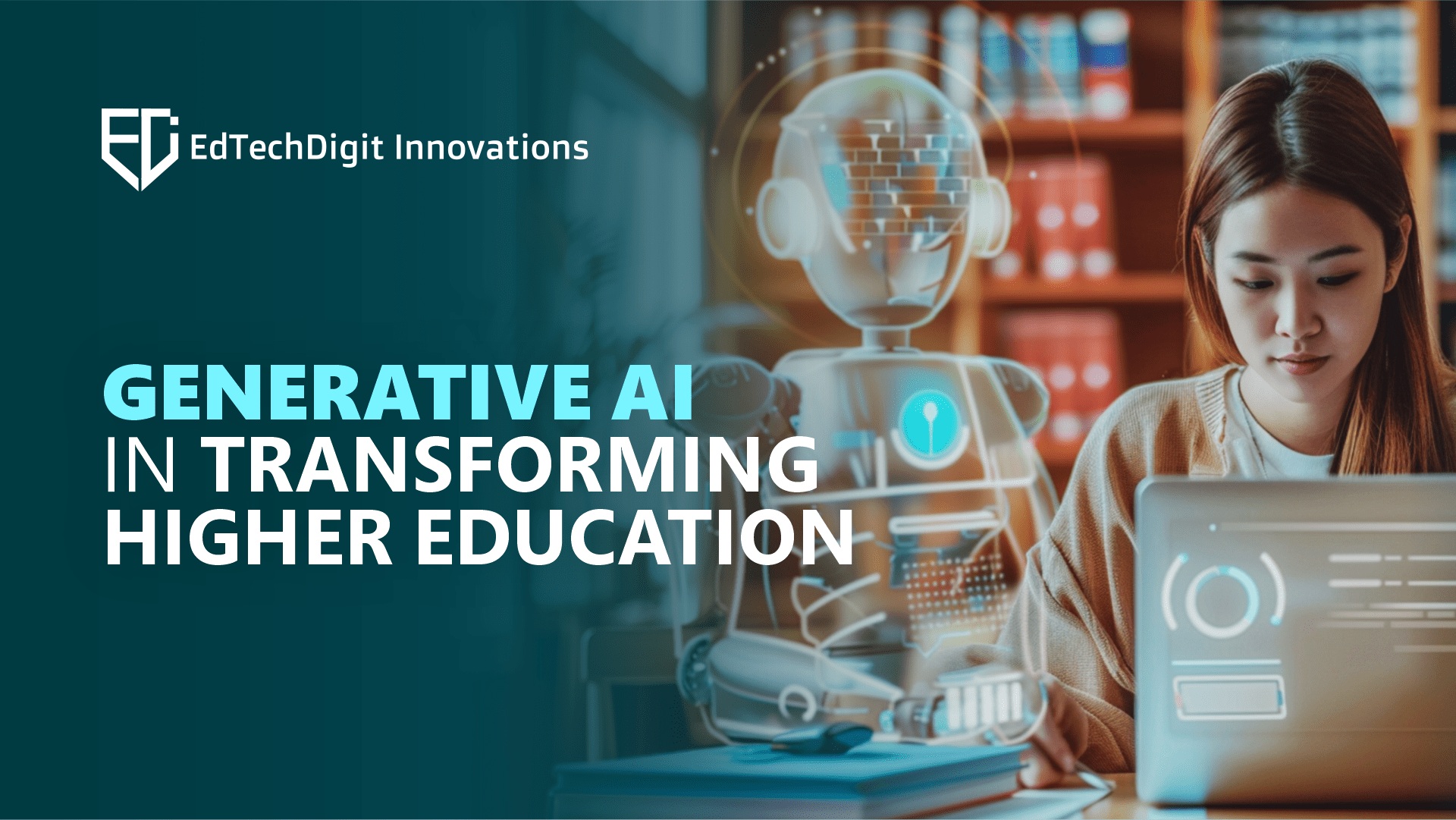Generative AI is becoming increasingly important in transforming businesses across all industries. This technology not only makes businesses more productive but has also made our lives more convenient. Generative AI also has a big role to play in transforming higher education and empowering individuals through personalized, targeted, and more adaptable learning and teaching experiences. A recent study by Microsoft highlighted that over 47% of education leaders use AI daily and is among the biggest contributors in driving the e-learning industry. You will be surprised to know that the global AI in education market is expected to reach $7.57 billion by the end of this year (The Business Research Company).
Higher education can be considered a sector that is highly resistant to rapid change. But with generative AI, this trend is changing now. The applications of generative AI in higher education are huge, right from enhancing learning to streamlining administrative tasks. But the institutes, universities, and EdTech companies must address issues associated with using AI in education.
So, let us dive deeper and understand how Generative AI is transforming higher education and what the future looks like.
Enhancing Learning and Knowledge Retention with Personalization
The biggest advantage of using generative AI in higher education is its power to personalize educational content and the learning experience of students. Traditional classroom education follows the one-size-fits-all model and is not considered suitable for the diverse learning needs and styles of students.
Generative AI effectively addresses this challenge. It can analyze huge amounts of student data, understand their strengths and weaknesses, and customize learning paths for them.
Generative AI is useful in the following ways to enhance learning:
- Adaptive learning platforms
AI-powered platforms can adjust the difficulty and pace of course content according to individual learners. For example, if a student is struggling with any concept, then the platform can provide additional resources, practice problems, and better explanations to understand easily.
- AI Tutor
AI can also provide a virtual tutor or mentor available 24/7 to clear students’ doubts and provide feedback.
Fueling Powerful Content Creation and Delivery
Not only can students benefit from Generative AI, but even tutors can use this incredible tool in higher education to create and deliver more understandable content. Here’s how generative AI can help:
- Automate content generation
Teachers can use it to generate lecture summaries, study guides, and even entire course modules.
- More engaging and interactive learning experience:
Generative AI can create more personalized, immersive, and engaging content to enhance student’s learning experience such as VR simulations or gamified learning modules.
- Content in several languages
Another big advantage of generative AI is that it can generate course content in multiple languages and make it suitable for students from across the world.
Streamlining Administrative Tasks
Apart from helping teachers and students, generative AI is a great tool to streamline administrative tasks and improve the efficiency of higher education institutions. Here is how:
- Automate grading
AI tools can be used to automate the grading of assignments as well as provide them with timely and personalized feedback on their performance and how to improve them.
- Predictive analytics
AI tools are capable of predictive analytics where they can analyze student data and identify students at risk of falling out so that they can be offered timely support and intervention. This will ultimately help improve student retention and graduation rates.
So, we understood how beneficial AI and generative AI in higher education are. However, they come with certain issues and challenges that must be addressed.
Ethical Considerations and Challenges of Generative AI in Higher Education
Here are some ethical considerations for using AI in higher education
- Bias
The most basic challenge of using AI is bias. AI systems are trained on vast amounts of data and if those data contain bias, then they will also impact the learning and administration in institutes.
- Data Privacy
As AI systems need to collect and analyze vast amounts of student data, many of which are highly confidential and sensitive, the use of AI also raises data privacy and security concerns.
- Skilled educators
Integration of AI in higher education also requires educators to upgrade their skills and learn how to effectively use AI for students and their benefits. So, educator training might be sometimes challenging as well as expensive.
But, by properly addressing these issues, AI can bring positive changes in the higher education sector and transform learning, teaching, and administration experience.
Conclusion
AI is no longer a futuristic concept. It has been deeply integrated into the operational level across various industries. And by effectively adopting AI and generative AI into the education sector, the world can witness a transformative effect. However, we must also understand that it is not a one-man task. It requires a collaborative approach where educators, technologists, policymakers, students, parents, and everyone must contribute to their role.
With a combined effort, AI can prove to be a great technology in personalizing learning, creating more engaging and interactive content, and streamlining institutional administrative tasks for greater efficiency.

